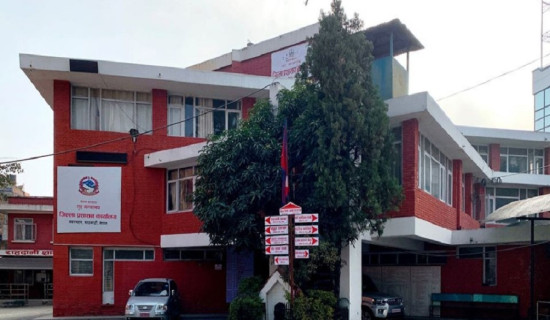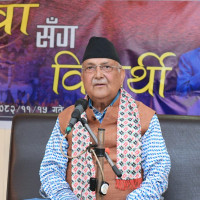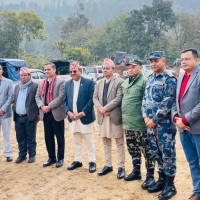- Friday, 27 February 2026
Nepal Safe For Tourists To Visit
Nepal was portrayed in a negative light globally once again last week due to the killing of dozens of youth and some security personnel, and unprecedented devastation of numerous public and private buildings and other properties in protests by Gen Z. The sudden unrest sent such an undesirable message to potential international tourists that the Himalayan country was not safe for them to visit. Amid that scenario, many vacationers from around the world have cancelled their trip to the country for the current autumn season, much to the chagrin of airlines, hoteliers, tour operators, and other stakeholders. A lot of visiting tourists had to go through hardships owing to the closure of the country’s main gateway, Tribhuvan International Airport (TIA), and the disruption of major roads and highways. Hundreds of tourists resorted to shortening their trip to the country as protests raged on. And tourism entrepreneurs were quite concerned about their business during this season.
Undeniably, the young people took to the streets to show their utter objection to thriving corruption and the rising problem of unemployment within the country. The youths, along with civil society members, had been raising the issues of accountability, responsiveness, and transparency in governance for a long time, as the successive governments had failed to work as per the former’s wishes and aspirations. As the entire service delivery system had been ineffective, even the common people had been getting fed up with the ruling political parties’ working style. Another reason for the emergence of their agitation was that the KP Sharma Oli-led government had banned various social media platforms, preventing the people from voicing their concerns.
Hope
However, the political discord has now come to an end with the formation of an interim government under the leadership of a former Chief Justice of the Supreme Court, Sushila Karki. With her good track record, Karki is expected to carry out her responsibility of ending the ongoing political transition by holding elections to the House of Representatives in the next six months. When she was in the judiciary, she was able to garner much public trust because of her anti-corruption rulings and simple lifestyle. No sooner had President Ram Chandra Paudel appointed her as the country’s first female Prime Minister on Friday (September 12), than a glittering hope was created among the general people that the situation would return to normalcy.
Although the latest strife had nothing to do with tourists, they showed their reluctance to visit Nepal in view of probable untoward incidents. Even the previous political movements had not targeted tourists. But it was widely acknowledged that even the mobility of tourists was interrupted because of the prohibitive orders and curfews. Hundreds of Indian travellers who were stranded in Kathmandu and other parts of Nepal cut short their trip. Besides their regular services, Air India and IndiGo Airlines operated a few chartered flights on the Kathmandu-Delhi route to rescue those stranded. With the political protests in Nepal turning violent, the Indian government even issued a travel advisory, asking its citizens not to visit the Himalayan country for the time being. Undoubtedly, India is the topmost tourist source market for Nepal. Many Indian vacationers come to the country every year. The two countries share a long, open, porous border. No passport or visa is required for Nepalis and Indians to cross the border.
As the situation in Nepal returned to normalcy immediately, no other countries felt it necessary to issue travel advisories against visiting the nation. Being an important tourist destination, Nepal receives more than one million foreign visitors annually. They visit the country to experience the unsurpassed scenic beauty and rich Nepali culture. The country is all set to host tourists as the situation has now become stable. Peace has been restored in the country. The government has also lifted restrictions, making it easier for everyone to move from one place to another. With these steps, all the economic activities are anticipated to resume gradually. For the past several years, Nepal’s economy has suffered one setback after another. So, the government needs to take some concrete efforts to boost the ailing national economy.
Job loss
What is distressing is that the entire business sector, including the tourism industry, has incurred huge losses as irate protesters caused damage to their industries, factories, and hotels, among other properties, nationwide. Hotel Association Nepal (HAN)’s preliminary estimates show that nearly two dozen hotels have undergone damage worth over Rs. 25 billion. According to HAN, Hotel Hilton Kathmandu alone suffered a loss of about Rs. 8 billion as the protesters had set fire to it. Thousands of workers and employees are bound to lose their jobs in the tourism sector alone. The physically damaged hotels and other enterprises will have to make additional investments for their rebuilding and refurbishment. Considering this, such businesses will have a tougher time paying back their bank loans on time.
Anyway, the business community has vowed to make every possible effort to resume their businesses despite challenges ahead. Unlike other sectors, tourism is a very susceptible but resilient industry, having multiplier effects on the national economy. Bearing this in mind, the government now needs to come up with an effective scheme to support the business sector as a whole. As the private sector is considered ‘an engine of growth’, it is essential for the government to facilitate it. They may contribute to creating more jobs and increasing the government’s revenue only when they are assured of a more business-friendly environment.
(The author is a former deputy executive editor of this daily.)

















